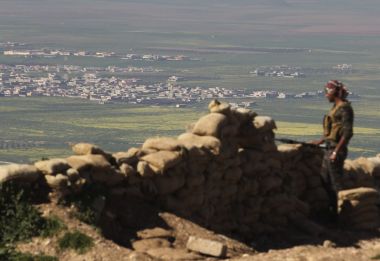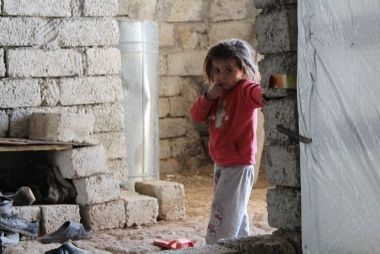A year after Islamic State took Mosul, millions of Iraqis have been forgotten
When the Iraqi city of Mosul fell to Islamic State a year ago, half a million people fled their homes.

They joined around 400,000 already displaced by fighting in Anbar province that began last January.
Many among them were Christians who were given the choice of leaving and facing the hazards of the road and the open country or staying put. If they did so, they had to choose between converting to Islam, paying a ruinous tax or being killed. A Christian presence that had stretched back for two millennia was wiped out almost overnight.
Altogether, in just 18 months, around 3 million people were displaced in Iraq. In total around 8 million Iraqis – a population the size of Switzerland – need "life-saving assistance". That figure is set to rise to around 10 million by the end of the year.
Yet aid agencies say that their needs are being overlooked because of the continued focus on the fighting between Islamic State and the government forces trying desperately to halt their advance and bring back some sort of peaceful normality to the region.
"With the world's attention focused on the militants and the response against them, we are at risk of forgetting the families who have lost everything they have in this crisis," says Kathleen Rutledge, Tearfund's middle east response director.
The rise of Islamic State has been a stunning reversal of the halting and tentative steps towards reconstruction in the region following the chaos that followed the Iraq war. Coalition support and a troop surge in 2007 had succeeded in quelling the worst of the violence and it was hoped that Iraq would emerge as a democratic and stable country. However, the US withdrew its forces in 2011 at the request of the Iraqi government under President Nouri al-Maliki and the Iraqi army, in spite of extensive training and rebuilding following its dismantling after the war, was unable to contain the Islamic State fanatics.
The Islamist rebels have been responsible for a catalogue of horrors. They have beheaded captives, burned them alive, tortured them and beaten them. They have driven whole populations out. They have forced captured women from the Christian and Yazidi communities into sexual slavery. They have committed mass murders.
While in the long term the Islamic State regime must fall, it is the here and now that troubles the aid agencies. Last week the United Nations launched a new appeal for funds after it revealed that resources were simply drying up. Its humanitarian co-ordinator for Iraq, Lise, Grande, said: "We know that in the next couple of months the humanitarian situation is only going to get worse. Right now our biggest problem is financing: we're running out of money."
She said that food rations had been reduced and that 77 clinics would be closed by the end of the month if no funding came through: "Close to 50 per cent of our operations are likely to be curtailed or shut down in the coming months if we don't get money. We are really in trouble."
On Thursday, the UN announced a fresh appeal for funds. It wants $497 million to provide "shelter, food, water and other lifesaving services over the coming six months", it says, with Grande asking: "Can we please rebalance international engagement to include international assistance?"

One of the saddest things about the appeal is that it is a 'bare-bones' package. The UN recognises that the ability of countries to fund the work isn't limitless. A $500 million donation from Saudi Arabia last year has been spent already – and as the country continues to fall apart, things can only get worse. Large parts of its grain-producing areas are under IS control, water and sanitation systems have been ruined and nearly 3 million children are not in school.
Grande says: "This is not the appeal that we would have wished to launch. As humanitarians, committed to upholding humanitarian principles, we would have liked to ask for funding to ensure that support packages in each cluster reach international standards. Because we are faced with a grim funding reality, we are asking only for minimum emergency packages."
So it's become just about keeping people alive when the needs are so much broader and deeper. As well as helping people to recover from trauma, there's also the need to educate their children, provide them with jobs and employment, and restore the functioning of government – all the time under the threat of Islamic State, which continues to pose a deadly risk.
One Assyrian Christian priest, Fr Emmanuel Youkhana, told Tearfund: "The damage is beyond material. You feel the people are collapsed from inside."
Rutledge says: "People who fled atrocities last summer are still stuck in a state of limbo, living in tents and unfinished buildings, desperately hoping for news of loved ones held captive. They've had to flee executions, sex slave markets and forced religious conversion. Many of them are educated people who had jobs and a decent standard of living, but now they have no way of providing for themselves and are forced to depend on outside support like ours." Tearfund is appealing for funds to help.
A refugee from Sinjar living in the Kurdish region of Iraq, Khalil, spoke of the devastation inflicted by Islamic State. "I studied accounting and was working with an oil company before," he says. "My brother and I built our own house. We were working for many years to build one house. ISIS came and destroyed it in one minute.
"I cried when we left our home. We spend our days just sitting, not working. We have no income and cannot make plans for the future."
Khalil's position is a grim echo of that of governments around the world. While Islamic State continues to increase its territory, the Iraqi army has shown itself unable to deal with it in the field, despite its superiority in numbers and equipment. Such successes as the Iraqi government has had have come with its use of Shia militia – potentially storing up problems for the future as it could paradoxically boost Sunni support for Islamic State. There is no appetite in other countries for military intervention, even if the Iraqi government wanted it. In Syria, where Islamic State is providing the main opposition to the regime of President Bashar al Assad, itself responsible for countless civilian deaths, it is even more deeply entrenched than it is in Iraq. The military conflict still looks as if it will be a long and painful one, which will only end when Islamic State loses the support it has managed to garner from the Sunni population itself.
Until then, the world has two choices: look the other way, or continue to provide the funds needed to keep people alive for as long as possible. The UN's appeal for funds is a purely practical response: Christians, though, are called to prayer as well – and not just for survival, but for a future and a hope.
Follow @RevMarkWoods on Twitter.











